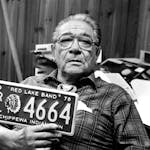Thi Bui's graphic novel about her family's exodus from Vietnam begins in New York, where she is giving birth to her son — a tiny, jaundiced mite who has a "faraway face with old man eyes." Over the next few days, as she struggles to breast-feed and care for the newborn, "a terrifying thought creeps into my head," Bui writes. "Family is now something I have created."
And family — complicated, difficult, sometimes tragic family — is at the heart of this intense and moving memoir. Bui is the narrator and only occasionally a character in the book, which focuses on her parents — their upbringing in Vietnam, their escape to the United States, their difficult life here.
We learn a sweeping, terrible history — the French occupation, the war, the stark division of the country, the rising power of the Communists, the brutality of the regime, the dangerous exodus of citizens — but always she brings it back to an intimate level. Politics are skimmed over; what is important are the bewildered people, trying to survive as their world changes and threatens them.
"I keep looking toward the past," Bui writes, "tracing our journey in reverse, over the ocean, through the war, seeking an origin story that will set everything right."
The details she records are unforgettable: a famished mother and son devouring a bit of sausage. A boy hiding underwater from soldiers until he nearly drowns. The starved dead piled up in handcarts to be hauled away.
Bui recounts how her father grew up impoverished in the countryside, with moments of joy punctuated by hunger and fear. Bui's mother, Má, came from wealth but had a mother who was imperious and ice-cold.
"I hated it when my mother hit the servants," Má recalls. "But she hit her children, too. We were all terrified of her."
In well-chosen words and black-and-white drawings splashed with a fiery orange wash, Thi Bui (pronounced TEE BOO-ee) tells this fierce story. As the book unfolds, she begins to see her parents in a new light, as people who have endured unimaginable hardship and are doing the best they can. And yet the story is devoid of sentimentality.
Memoir is a fast-morphing genre, nearly as elastic in form as the novel. Memoirs are told in photographs and in poems, in chronological narratives and in text that meanders in time and place. Poet Eileen Myles' new memoir, "Afterglow," is told partly by her dog (her dead dog).
Memoirs told in comic book style, such as this one, are growing more popular. But Bui's is the most moving I've seen this year: passionate, intimate, tackling huge themes — love, war, history, emigration — while focused intensely on one family.
If you want to better understand the history and scope of the Vietnam War, if you want to understand what immigrants have endured, and continue to endure, you can start with no better book.
Laurie Hertzel is the senior editor for books at the Star Tribune. Twitter: @StribBooks
The Best We Could Do
By: Thi Bui.
Publisher: Abrams, 329 pages, $24.95.






